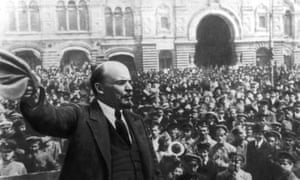
The Bolshevik leader is too often cast as a romantic figure in this readable story of his journey out of exile to seize power in 1917

Lenin addresses a Moscow rally in October 1917. Photograph: Print Collector/Getty Images
On Easter Monday, 9 April 1917, allied troops went over the top on the first day of the Battle of Arras – an offensive that would take 160,000 British lives, including the poet Edward Thomas. On that same snowy morning, a small, bald Russian with a goatee beard, accompanied by his wife and 30 companions, boarded a train in Zurich, where he had been living in exile. Vladimir Ilyich Lenin was about to steam into history.
It was no ordinary passenger carriage that the veteran revolutionary and his comrades occupied. The third-class coach with its hard wooden seats made its laborious way across a Germany struggling for survival in the first world war. A chalk line drawn across the floor of the carriage separated the Russians from their German military minders, for the two countries were at war and Lenin’s sealed train represented a desperate last throw of the dice by the Kaiser’s government in Berlin.
They were gambling that by smuggling Lenin into revolutionary St Petersburg, the Bolshevik leader’s charismatic presence would cause enough chaos to knock Russia out of the war. This, in turn, would allow the Germans to concentrate their forces on defeating the British and French on the western front before the mighty US – which entered the war that same month – could hand victory to the allies.
The German gamble succeeded beyond their wildest dreams – turning, in fact, into a nightmare for them and the rest of the capitalist powers. For Lenin, in Churchill’s phrase the “plague bacillus” inserted so clumsily into Russia’s fluid body politic, succeeded by sheer force of persuasion and his own implacable will in convincing his more cautious comrades that their disciplined and organised Bolshevik party could seize power themselves. That October they tore it from the fumbling hands of the post-revolutionary provisional government and created the world’s first communist state.
Catherine Merridale, an experienced and enthusiastic historian of Russia, has chosen the pivotal moment of Lenin’s slow and halting odyssey to hang her history of how this ruthless fanatic hijacked a revolution and refashioned it in his own cruel and grim image.
FacebookTwitterPinterest Lenin banners are displayed at a march through Moscow for International Workers’ Day last May. Photograph: Mikhail Japaridze/TASS
With a novelist’s readability and a fertile imagination – she even tells us what Lenin was looking at as he gazed out of the train’s windows – Merridale retraces his week-long journey from Germany, via Sweden and Finland, to the Russia he had not seen for nearly 20 years. At the same time, she skilfully weaves into the story the unfolding revolution in St Petersburg and the background to Lenin’s long exile, especially the vicious ideological feuds between his “extremist” Bolsheviks and the “moderate” Mensheviks.
Advertisement
When the February revolution broke out in Russia, Lenin found himself stranded in sleepy, neutral Switzerland. The only way home was through Germany, and so the exiled and agonisingly frustrated Bolshevik leader, acting through a slimy intermediary aptly named Helphand, negotiated the deal to get himself and his disciples shipped back to Russia. His enemies used his collaboration with the enemy to discredit him as a traitor, and Merridale spends several pages proving that the puritanical Lenin did not actually receive German gold himself, as alleged – before rather spoiling her argument by admitting that he would have taken roubles from the devil himself in order to achieve his revolutionary aims.
While dutifully and briefly acknowledging that once in power Lenin proved a tyrannical, murderous despot, Merridale often appears to forget this and for the bulk of the book adopts a romantic admiration for the strength of his mind, the incisive guillotine of his contempt for deviationists and backsliders, his homely lifestyle, and the sheer force of his steely personality. Nonetheless, we all know where that led, and in a tragic coda she lists the fates of many of those who travelled with him on the train: they were tortured, shot, imprisoned, exiled, or simply disappeared into the all-consuming night of Stalin’s Gulag. That was the ultimate destination of Lenin’s train.
On Easter Monday, 9 April 1917, allied troops went over the top on the first day of the Battle of Arras – an offensive that would take 160,000 British lives, including the poet Edward Thomas. On that same snowy morning, a small, bald Russian with a goatee beard, accompanied by his wife and 30 companions, boarded a train in Zurich, where he had been living in exile. Vladimir Ilyich Lenin was about to steam into history.
It was no ordinary passenger carriage that the veteran revolutionary and his comrades occupied. The third-class coach with its hard wooden seats made its laborious way across a Germany struggling for survival in the first world war. A chalk line drawn across the floor of the carriage separated the Russians from their German military minders, for the two countries were at war and Lenin’s sealed train represented a desperate last throw of the dice by the Kaiser’s government in Berlin.
They were gambling that by smuggling Lenin into revolutionary St Petersburg, the Bolshevik leader’s charismatic presence would cause enough chaos to knock Russia out of the war. This, in turn, would allow the Germans to concentrate their forces on defeating the British and French on the western front before the mighty US – which entered the war that same month – could hand victory to the allies.
The German gamble succeeded beyond their wildest dreams – turning, in fact, into a nightmare for them and the rest of the capitalist powers. For Lenin, in Churchill’s phrase the “plague bacillus” inserted so clumsily into Russia’s fluid body politic, succeeded by sheer force of persuasion and his own implacable will in convincing his more cautious comrades that their disciplined and organised Bolshevik party could seize power themselves. That October they tore it from the fumbling hands of the post-revolutionary provisional government and created the world’s first communist state.
Catherine Merridale, an experienced and enthusiastic historian of Russia, has chosen the pivotal moment of Lenin’s slow and halting odyssey to hang her history of how this ruthless fanatic hijacked a revolution and refashioned it in his own cruel and grim image.

FacebookTwitterPinterest Lenin banners are displayed at a march through Moscow for International Workers’ Day last May. Photograph: Mikhail Japaridze/TASS
With a novelist’s readability and a fertile imagination – she even tells us what Lenin was looking at as he gazed out of the train’s windows – Merridale retraces his week-long journey from Germany, via Sweden and Finland, to the Russia he had not seen for nearly 20 years. At the same time, she skilfully weaves into the story the unfolding revolution in St Petersburg and the background to Lenin’s long exile, especially the vicious ideological feuds between his “extremist” Bolsheviks and the “moderate” Mensheviks.
Advertisement
When the February revolution broke out in Russia, Lenin found himself stranded in sleepy, neutral Switzerland. The only way home was through Germany, and so the exiled and agonisingly frustrated Bolshevik leader, acting through a slimy intermediary aptly named Helphand, negotiated the deal to get himself and his disciples shipped back to Russia. His enemies used his collaboration with the enemy to discredit him as a traitor, and Merridale spends several pages proving that the puritanical Lenin did not actually receive German gold himself, as alleged – before rather spoiling her argument by admitting that he would have taken roubles from the devil himself in order to achieve his revolutionary aims.
While dutifully and briefly acknowledging that once in power Lenin proved a tyrannical, murderous despot, Merridale often appears to forget this and for the bulk of the book adopts a romantic admiration for the strength of his mind, the incisive guillotine of his contempt for deviationists and backsliders, his homely lifestyle, and the sheer force of his steely personality. Nonetheless, we all know where that led, and in a tragic coda she lists the fates of many of those who travelled with him on the train: they were tortured, shot, imprisoned, exiled, or simply disappeared into the all-consuming night of Stalin’s Gulag. That was the ultimate destination of Lenin’s train.
No comments:
Post a Comment